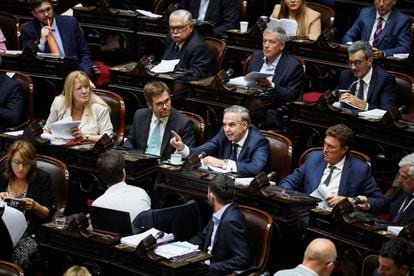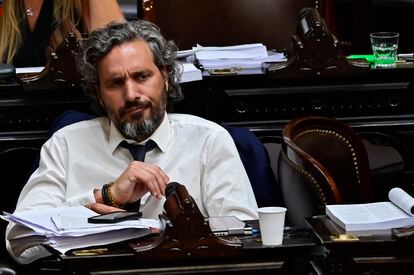Since this Wednesday, Congress is debating the Argentine refoundation proposed by Javier Milei. It has been a long day in the Chamber of Deputies, where congressmen have argued all day in a session that will probably last until Friday, and tense in the streets of Buenos Aires, where the federal police have repressed some of the Thousands of protesters gathered in the square in front of Congress.
The session began after 10 in the morning with the presence of 137 deputies, just over half of those that make up the lower house of the Argentine Congress. The ruling party needed at least 129 deputies of the 257 to appear for the debate to enable it. The quorum was guaranteed with the 38 seats of the ruling party, with the 37 of the PRO of former conservative president Mauricio Macri, the 34 of the center-right Radical Civic Union (UCR), and a large block of federal forces and other minority groups, in addition to some legislators from the Peronist alliance Unión por la Patria and from the left, who enabled the debate with their presence despite the fact that they oppose the project.
The debate began with the swearing in of two new deputies. Mónica Ferreyra, from the ruling party, occupied the ruling party seat released by Milei's chancellor, Diana Mondino, and dedicated her assumption to “the children who grow in the mother's womb.” On the other hand, the Peronist Ernesto Nader Ali did it out of “loyalty” to his “ideological doctrine.” The formal debate had not yet begun, but tension was guaranteed. The Argentine deputies then embarked on a debate that will last at least 40 hours, while they discuss point by point the almost 400 articles of the megalaw with which Milei seeks to arrogate special legislative powers, privatize state companies and deregulate the Argentine economy.
The ruling party is guaranteed its 38 votes and the PRO's 37. He will have to convince some of the deputies of the UCR or the federal forces, who have guaranteed a quorum but not vote a blank check.
Having just begun the debate, the leader of the Unión por la Patria deputies, Germán Martínez, tried to have the file returned to committee, but the proposal was rejected with 149 votes against. Another bench member summarized the position of the Peronist coalition: “There are no redeemable things. The content is contrary to the interest of Argentines.” The left joined the criticism. “I hope that in the days that this session lasts, there will be many and many who are on the streets,” asked the representative and former presidential candidate Myriam Bregman. “The only language that governments understand is that of mobilization, that is the only tool that guarantees that they do not blow everything up.”
Congress had been fenced off early in the morning and federal security forces stood guard around the building awaiting demonstrations in the streets. Around five in the afternoon, when some of the people summoned mainly by leftist organizations demonstrated in the square in front of Congress, the police deployment escalated. The Minister of Security, Patricia Bullrich, activated the new Government's protocol to repress street closures, and the federal police beat protesters, fired tear gas, and deployed their forces in water cannon trucks and officers on motorcycles who pushed the protesters towards the sidewalks The protesters were directly challenging the protocol, which they consider illegal because it restricts the right to protest and prohibits blocking streets, demonstrating with their faces covered or taking children to the marches.

Those present assure that at that moment Gendarmerie agents were deployed, two fire hydrant trucks appeared that had not been turned on until eight at night and pepper spray was fired. “There are detainees, there are wounded, I myself am wounded. They dragged me and scratched me. And no one attacked any police officer,” said left-wing leader Eduardo Belliboni, who blamed the Minister of Security for the incidents. “We are going to continue here. The law is going to make this an everyday thing,” he indicated.
While Belliboni spoke about a blocked street, agents from the different security forces contained some of the protesters on the sidewalks and dispersed them in the square in front of Congress. “This deployment is unnecessary,” said one of the protesters, Azul Paredes, 23, who is active in the Socialist Workers Movement. “If there is this deployment to repress a peaceful demonstration, it is because the law does not support the law or the DNU. The Government is trying to prove something, it is a show for the voters of La Libertad Avanza and those who do not want street closures,” she said, surrounded by flags of leftist movements.

for the Homeland, listens to the debate, on January 31.MATIAS MARTIN CAMPAYA (EFE)
The debate takes place in extraordinary sessions called by the Government during the summer recess. The Executive intended to give express treatment to the project, which in its original version had more than 600 articles, but had to extend the deadline for the extraordinary sessions until next February 15. Legislators debated the initiative in specialized commissions for a month and after negotiations, the project lost almost 200 articles. The ruling party acknowledged “errors” in the writing and agreed to give in on some of the points.
Milei no longer seeks up to four years of special powers that allow him to govern by decree, now he only asks for two. He also accepted the “errors” in the writing of the Security chapter, in which an article proposed controlling meetings of more than three people in public, and has eliminated the oil company YPF from the list of the 41 state companies that it intends to privatize. Now there are 37 left, with three others, such as Banco Nación, the electric power generator Nucleoeléctrica and the satellite telecommunications company ARSAT open only to partial capitalization. He will not seek to reform the electoral system either.
This Wednesday, at the beginning of the session, the articles removed from the law were read out loud: “13, 31, 71, 72, 81…”. The law that survives will be known after one of the longest debates in the history of the Argentine Congress.
Subscribe here to newsletter from EL PAÍS América and receive all the key information on current events in the region.
#Marathon #Argentine #Congress #debate #scrapping #law #State #Milei